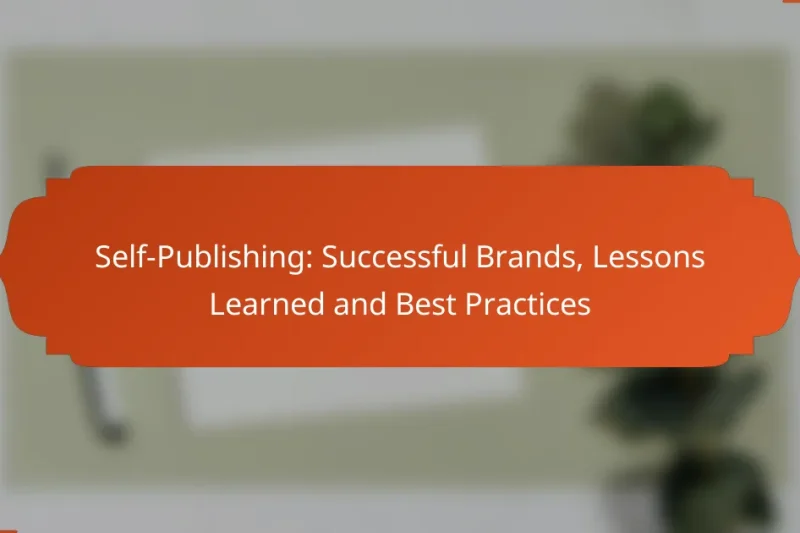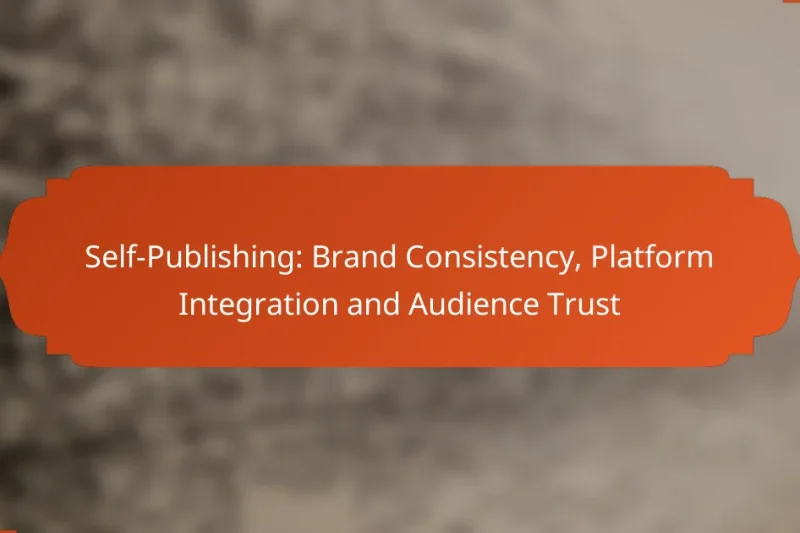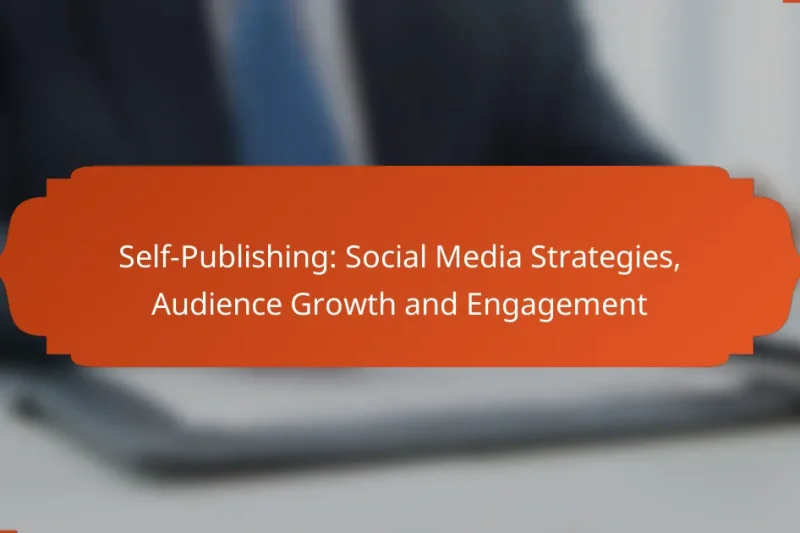Self-publishing presents authors with significant long-term benefits, such as enhanced creative control and the potential for … Self-Publishing: Long-Term Benefits, Brand Loyalty and Market SustainabilityRead more
Building Your Author Brand
Building your author brand is essential for establishing a professional presence that resonates with your target audience. By creating a cohesive identity through a professional website, active social media engagement, and direct communication, you can effectively connect with readers and enhance your visibility in the literary community.
Self-Publishing: Successful Brands, Lessons Learned and Best Practices
Self-publishing has emerged as a viable avenue for authors looking to share their work with the … Self-Publishing: Successful Brands, Lessons Learned and Best PracticesRead more
Self-Publishing: Brand Consistency, Platform Integration and Audience Trust
In the world of self-publishing, brand consistency is crucial for establishing audience trust and recognition. By … Self-Publishing: Brand Consistency, Platform Integration and Audience TrustRead more
Self-Publishing: Author Branding, Market Trends and Competitive Edge
Self-publishing offers authors the opportunity to build a unique brand that resonates with their target audience, … Self-Publishing: Author Branding, Market Trends and Competitive EdgeRead more
Self-Publishing: Budget-Friendly Strategies, Brand Development and Market Reach
Self-publishing offers authors the opportunity to bring their work to life without breaking the bank. By … Self-Publishing: Budget-Friendly Strategies, Brand Development and Market ReachRead more
Self-Publishing: Personal Branding, Market Positioning and Audience Engagement
Self-publishing offers authors a powerful platform to enhance their personal branding and connect with their audience. … Self-Publishing: Personal Branding, Market Positioning and Audience EngagementRead more
Self-Publishing: Social Media Strategies, Audience Growth and Engagement
In the competitive world of self-publishing, effective social media strategies are essential for increasing visibility and … Self-Publishing: Social Media Strategies, Audience Growth and EngagementRead more
How can you establish your author brand online?
Establishing your author brand online involves creating a cohesive and professional presence that reflects your writing style and connects with your target audience. This can be achieved through a combination of a professional website, active social media engagement, and direct communication with readers.
Create a professional website
A professional website serves as the central hub for your author brand. It should include an engaging homepage, an about page, a blog for updates, and a portfolio showcasing your work. Ensure the design is user-friendly and mobile-responsive, as many readers will access it via smartphones.
Consider including a contact form for inquiries and a newsletter signup to build your email list. Regularly update your website with fresh content to keep visitors returning and improve your search engine visibility.
Utilize social media platforms
Social media platforms are essential for building your author brand and engaging with your audience. Focus on platforms where your target readers are most active, such as Twitter, Instagram, or Facebook. Share insights about your writing process, book updates, and personal anecdotes to create a relatable image.
Consistency is key; post regularly and interact with followers to foster a community around your work. Use relevant hashtags to increase your visibility and reach a broader audience.
Engage with your audience through newsletters
Newsletters are a direct way to communicate with your readers and keep them informed about your latest projects. Use an email marketing service to create visually appealing newsletters that include updates, exclusive content, and links to your blog or social media.
Encourage sign-ups by offering a freebie, such as a short story or a writing guide. Aim for a monthly or bi-monthly schedule to maintain engagement without overwhelming your subscribers.
Showcase your work on platforms like Goodreads
Goodreads is a powerful platform for authors to showcase their work and connect with readers. Create an author profile that includes your biography, book listings, and links to your website and social media. Engage with readers by responding to reviews and participating in discussions.
Consider hosting giveaways or participating in book clubs to increase your visibility and attract new readers. Regularly update your profile with new releases to keep your audience informed.
Leverage Amazon Author Central
Amazon Author Central allows you to manage your author profile on Amazon, which is crucial for visibility in the book marketplace. Set up your profile with a professional photo, biography, and links to your social media. Ensure your book listings are accurate and up-to-date.
Utilize the platform’s features to track your sales and reader reviews. Regularly update your profile with new releases and promotional content to maximize your reach on one of the largest book-selling platforms.
What are effective branding strategies for authors?
Effective branding strategies for authors focus on establishing a distinct identity that resonates with readers. This involves creating a unique voice, maintaining a consistent visual presence, and building relationships within the literary community.
Develop a unique author voice
Your author voice is the distinctive style and tone that sets you apart from others. It reflects your personality and influences how readers perceive your work. To develop this voice, write regularly and experiment with different styles until you find one that feels authentic.
Consider your target audience when shaping your voice. For instance, if you write for young adults, a conversational and relatable tone may be effective. Conversely, a more formal style might suit academic or literary fiction.
Create a consistent visual identity
A consistent visual identity includes your book covers, website design, and social media profiles. This visual branding should reflect your genre and personal style, making it easily recognizable to readers. Use a cohesive color palette and typography across all platforms.
For example, if you write thrillers, dark colors and bold fonts may convey the right mood. Ensure that your visual elements align with your author voice to create a unified brand experience.
Network with other authors and influencers
Networking is crucial for building your author brand. Engage with fellow authors and influencers in your genre through social media, writing groups, or literary events. This can lead to collaborations, guest blogging opportunities, and increased visibility.
Attend local book fairs or online webinars to connect with potential mentors and peers. Building relationships within the literary community can provide support and open doors for promotional opportunities, enhancing your brand’s reach.
How can authors use social media to build their brand?
Authors can effectively use social media to build their brand by engaging with their audience, sharing valuable content, and creating a recognizable online presence. This approach helps to foster a community around their work and enhances visibility in a competitive market.
Share behind-the-scenes content
Sharing behind-the-scenes content allows authors to connect with their audience on a personal level. This could include snippets of the writing process, insights into character development, or glimpses of their workspace. Such transparency can humanize the author and create a sense of intimacy with readers.
Consider posting photos or videos that showcase your daily writing routine or the challenges you face. This not only engages followers but also invites them to be part of your creative journey.
Host live Q&A sessions
Live Q&A sessions are an excellent way for authors to interact directly with their readers. These sessions can be conducted on platforms like Instagram Live or Facebook Live, allowing authors to answer questions in real-time, discuss their work, and receive immediate feedback.
To maximize engagement, promote the session in advance and encourage followers to submit questions beforehand. This preparation can lead to a more dynamic and fulfilling experience for both the author and the audience.
Participate in relevant hashtags
Using relevant hashtags can significantly increase an author’s visibility on social media. By participating in trending hashtags related to writing, reading, or specific genres, authors can reach a broader audience and connect with potential readers.
Research popular hashtags in your niche and incorporate them into your posts. This strategy not only helps in gaining followers but also establishes your presence within specific literary communities.
What are the best practices for author websites?
The best practices for author websites include optimizing for search engines, incorporating a blog for content marketing, and ensuring mobile-friendliness. These strategies enhance visibility, engage readers, and improve user experience.
Optimize for SEO
Search engine optimization (SEO) is crucial for increasing your author website’s visibility. Start by researching relevant keywords that potential readers might use to find books in your genre, and incorporate these terms naturally into your website content.
Additionally, ensure your website has a clean structure with clear navigation. Use descriptive titles and meta descriptions for each page, and consider adding alt text to images to improve accessibility and SEO performance.
Include a blog for content marketing
A blog can serve as an effective tool for content marketing, allowing you to connect with your audience and showcase your expertise. Regularly posting articles related to your writing process, book themes, or industry insights can attract more visitors to your site.
Consider creating a content calendar to maintain consistency in your blog posts. Aim for a frequency that works for you, whether that’s weekly, bi-weekly, or monthly, and promote your posts on social media to reach a wider audience.
Make it mobile-friendly
With a significant number of users accessing websites via mobile devices, ensuring your author website is mobile-friendly is essential. Use responsive design techniques to ensure your site adapts seamlessly to different screen sizes.
Test your website on various devices to identify any usability issues. Focus on fast loading times, easy navigation, and readable text without the need for zooming. A mobile-friendly site enhances user experience and can positively impact your search engine rankings.
How can authors measure their brand success?
Authors can measure their brand success through various metrics that reflect their visibility and engagement with readers. Key indicators include website analytics, social media interactions, and audience feedback, which provide insights into how well their brand resonates with the target audience.
Track website analytics
Website analytics offer crucial data on visitor behavior, helping authors understand how users interact with their content. Key metrics to monitor include page views, average session duration, and bounce rates. Tools like Google Analytics can provide these insights, allowing authors to see which pages attract the most traffic and where visitors drop off.
To effectively track brand success, set specific goals for your website, such as increasing unique visitors by a certain percentage or improving the average time spent on the site. Regularly review these metrics to identify trends and adjust your content strategy accordingly.
Monitor social media engagement
Social media engagement is a vital measure of an author’s brand success, reflecting how well they connect with their audience. Key metrics include likes, shares, comments, and follower growth across platforms like Facebook, Twitter, and Instagram. Regularly analyzing these metrics can help authors gauge the effectiveness of their posts and overall brand presence.
To enhance engagement, consider posting consistently and interacting with followers through comments or direct messages. Avoid focusing solely on follower counts; instead, prioritize meaningful interactions that foster a loyal community around your brand.






